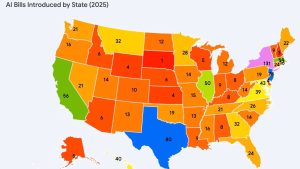
The need to negotiate and enforce digital trade commitments is receiving renewed attention in the U.S. government, with bipartisan support coalescing around re-asserting U.S. leadership on the global stage.
With a new Administration set to take charge of U.S. trade and foreign policy in 2025 regardless of the election results, a series of recent actions and comments from members of Congress suggest that the arguments that have held back progress on digital trade in the past few years may be losing ground. Policymakers appear to be ready to turn the page and re-insert the United States as a leader in digital trade on the world stage.
Past Excuses for Withdrawing on Digital Trade Receive Close Scrutiny on Capitol Hill
At a Sep. 20 hearing dubbed “Protecting American Innovation by Establishing and Enforcing Strong Digital Trade Rules,” held by the Trade Subcommittee of the House Ways & Means Committee, members and witnesses examined the importance of digital trade rules to the U.S. economy, freedom of expression and human rights abroad, and the ability of small businesses to operate in remote markets with small workforces.
In recent years, the Office of the U.S. Trade Representative (USTR) has taken a step back from negotiating new commitments to cross-border data flows, prohibitions on countries imposing unjust data localization requirements, and ensuring countries cannot indiscriminately mandate the disclosure of a company’s source code as a condition for operating in a market. The witnesses at the hearing underscored why these trade commitments are so essential to a variety of U.S. interests.
These trade commitments—which have long enjoyed bipartisan support—have been left behind by this USTR due to a perceived need to first introduce measures to regulate domestically (particularly with respect to consumer protections) before determining what promises we can make globally. However, issues seen as front-and-center in the digital economy, such as the regulation of privacy and artificial intelligence, either do not intersect with, or are perfectly compatible with international agreements. On the other hand, failing to secure protections for digital services on the global stage and declining to enforce existing measures has tangible harms and puts the United States in a position of weakness.
As one Democrat, Suzan DelBene (WA), who is co-chair of the Digital Trade Caucus, noted: “if we step back from the negotiating table until Congress acts, we run a serious risk of harming the very objectives, such as defending American companies, protecting privacy, and supporting a free and open internet, that have been core to U.S. policy for many years.”
This led to the following back-and-forth with Evangelos Razis, of the software vendor and work management company Workday, that is central to the debate that has, so far this Administration, held progress on digital trade policy back:
DelBene: “Does the U.S. entering into trade agreements prevent Congress or the Administration from legislating or regulating on important issues domestically?”
Razis: “In short, no, we don’t see any tension between privacy protections and strong digital trade rules. Many of the privacy frameworks, either that have been proposed here, and we agree federal privacy reform is long overdue, or, you know, the one of the 19 comprehensive state laws that have been enacted, have no tension with either USMCA or the US-Japan agreement. That’s because those laws or bills don’t enact data localization requirements, they don’t restrict the free flow of transfers of information. And importantly, within USMCA, there’s a pretty clear language that if there should be any tension in the future between domestic regulation and international trade agreements, U.S. law prevails.”
The judgment that pursuing privacy rules for personal data in no way infringes on digital trade rules (existing or new) is shared across the Capitol as well—following a Senate Finance Committee hearing in April, both Democrats and Republicans on the subcommittee sent questions scrutinizing the deprioritizing of digital trade over the past several years from USTR. Among the Questions for the Record posed to USTR Ambassador Katherine Tai, released in late September, Sen. Maria Cantwell (D-WA) scrutinized USTR’s recent actions on digital trade and reiterated the fact that domestic legislation should not be seen as an excuse to retreat from the global fight to support U.S. digital exports:
In October, USTR withdrew its support at the WTO for long-held positions that would have allowed the free flow of data, protected forced transfer of American technology, and combat data localization requirements. USTR also dropped reference to countless digital trade barriers in the 2024 NTE Report (National Trade Estimate Report on Foreign Trade Barriers) and stopped standing up against digital protectionism abroad, just as U.S. services exporters are facing a barrage of harmful barriers and a proliferation of discriminatory regulatory thresholds around the world… Similarly, you suggested that one reason for backing out of digital trade negotiations and rescinding support for strong digital trade commitments at the WTO and IPEF is a lack of a domestic privacy law. I wrote the American Privacy Rights Act, a privacy law draft with a colleague Congresswoman McMorris Rodgers. In my view, this proposal is fully consistent with existing digital trade rules, such as those in USMCA, and would not interfere with your ability to replicate those rules in other trade forums, including the WTO and IPEF.
In April, Sen. Marsha Blackburn (R-TN), also a co-sponsor of a privacy proposal, also told USTR Ambassador Katherine Tai that her and other members’ efforts to pursue privacy rules do not contradict trade commitments, citing the many countries with digital trade agreements that have robust privacy laws on the books.
This is a welcome refrain that is starting to gain traction: pursuing domestic policies in the technology sector should not be viewed as precluding international negotiations, as long as they do not unjustifiably discriminate on the basis of nationality or impose restrictions inconsistent with longstanding principles of fairness, due process, and protection of companies’ proprietary technologies.
In a similar vein, although members of the subcommittee voiced concerns at the Sep. 20 hearing, elevated by a representative of the AFL-CIO, on the impacts of digital trade on labor issues, the specific worries raised in the hearing—such as employment protections regarding artificial intelligence and surveillance of workers—are those that would be addressed through domestic policy, and that are almost entirely unrelated to traditional trade commitments.
To the extent that labor interests want such issues included in future trade negotiations, the United States could certainly do so–but binding commitments in such areas would require a domestic legal foundation which does not yet exist. To say that one should not negotiate anything until that happens, even when the proposed areas of interest are outside the scope of current rules (and thus not constrained by them) is a long-term strategy for non-engagement internationally, which is hard to square with the enormous offensive interests the U.S. should be advancing.
Further, whether or not employers are able to leverage AI tools or worker monitoring programs does not impinge on cross-border trade, unless such rules and regulations exclusively target foreign companies to the benefit of U.S. providers. As Rob Atkinson, President of the Information Technology and Innovation Foundation, told the committee in response to the assertions that digital trade negotiations should be reconsidered due to the development of technology in the workforce:
“If you want to regulate how technologies monitor their employees, you have every right to do that. It’s not going to violate any trade agreement… We can and should have a national privacy bill. But it doesn’t mean that a company doing business here can’t move the data to a server or cloud center in Ottawa or in Montreal… If Congress wants to put in place laws that intentionally discriminate against foreign companies, that’s what you cannot do.”
Additionally, arguments that digital trade rules and commitments are harmful to the workforce fail to account for the vast benefits derived from the digital economy in the United States. The digital economy supports 8.9 million jobs in the United States, and jobs in the industry are, on average, high-quality. These jobs extend to the broader U.S. economy as well, encompassing firms both large and small. Traditional sectors—pharmaceutical development, health care, transportation, travel, and agriculture—are much better off thanks to digitalization, and they support technology workers whose wages are 125% higher than the median national wage. Such benefits are spread broadly across U.S. states, strengthening the economy at the national and state-level.
Meanwhile, digital trade protections are essential for small businesses operating abroad. The better the access smaller businesses and startups have to foreign markets, the better their chances are for expanding and growing—both in profit and workforce size. As Olivia Walch, CEO and founder of sleep app Arcascope, told the subcommittee of the choice of startups between adhering to unreasonable barriers abroad and hiring more engineers to improve their product:
“Like most small companies, we reach these users through an infrastructure of service providers—for distribution, subscription processing, authentication and analytics—that each handle user data. The services range from as critical as handling how users login to as simple as tracking which buttons they click. We’ve invested time, effort, and energy into engineering our backend to carefully handle this data. We can’t afford to constantly re-engineer this backend or consult our lawyer in response to policy changes requiring us to store data locally or pay country-specific tariffs— we lack the resources. After all, two weeks of our lawyer’s time is half an engineer’s salary. If we were in a position where the choice was redoing our backend or leaving the country whose specific rules were presenting a compliance challenge, we would almost certainly just stop operating in that country.”
There is a Growing, Bipartisan Desire for the United States to Lead on Digital Trade
Action is wanted on Capitol Hill and around Washington, D.C. on responding to the expansion of digital trade barriers globally.
Even following the aforementioned broad withdrawal from concluding new digital trade commitments—or enforcing existing rules on the books—by USTR, there has been a growing appetite for a proactive, front-facing posture towards supporting U.S. digital exports in other areas of the Administration.
The day before the House Ways & Means Subcommittee hearing, the Commerce Department announced several initiatives aimed at improving U.S. digital trade and competitiveness in the sector, including new reporting processes, expanding digital trade missions, and strengthening small business export support mechanisms and digital attaché training.
This followed actions from the Commerce Department earlier this year securing commitments to promote the cross-border delivery of digital services with Kenya (with a focus on cross-border data flows) and Singapore (with a focus on harmonizing approaches to artificial intelligence).
This year, the White House’s Council of Economic Advisers and the President’s Export Council also both detailed the importance of digital trade—and rules protecting U.S. digital exports—to broader U.S. economic interests and workforce development, as I have covered previously. In May, the State Department highlighted the importance of pursuing “international engagement to enhance interoperability, security, and market access” as barriers to digital trade and access to online services increase for securing U.S. diplomatic priorities abroad, as I have documented.
The conclusion of all of these agencies has been similar: re-engage the United States on fostering the cross-border delivery of digital services globally. This has been a striking reaction to the void left by USTR’s drastic tone-shift away from proactive digital trade engagement.
Come January 2025, USTR has a prime opportunity to ensure a whole-of-government approach to promoting U.S. ideals in the digital space globally and catalyzing exports of digital products and services abroad for companies large and small, as well as the workforce that thrives on this sector.
Quick facts on the importance of digital trade:
- Digital trade rules, whether in digital-specific agreements or included as provisions of comprehensive free trade agreements, help sustain the open internet and provide digital products and services providers with the reliable landscape to operate in foreign countries.
- U.S. digital exporters earned $655.5 billion from digitally-deliverable services exports in 2023, with a $266.8 billion surplus.
- Digitally-deliverable services exports represented 64% of all U.S. services exports in 2023, which is overall a key area of strength in overall trade for the United States.
- Meanwhile, digital trade specifically supported 3 million jobs in the United States in 2022
- The broader digital economy contributed to 8.4 million U.S. jobs and supported 382,000 firms in 2021, according to CCIA Research.
- The digital economy drove $1.3 trillion in annual compensation for workers in 2022.



